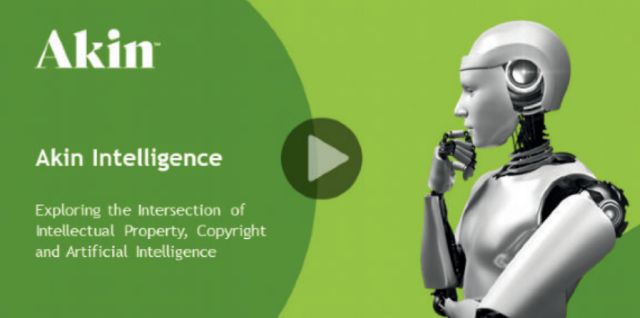Welcome to the December edition of Akin Intelligence. Since our November newsletter, the European Union (EU) came to a political agreement on the Artificial Intelligence (AI) Act, a first-of-its-kind AI regulation with global reach. On this side of the pond, federal agencies and states continued to tackle specific issues. Meanwhile, AI products continue to develop rapidly, including the recent releases of Anthropic's Claude 2.1 update and Google's multimodal model, Gemini.
To ensure continued receipt, please subscribe to future issues here if you have not already done so. For past issues and other AI content, check out Akin's AI & ML Insights.
In This Issue
- Akin Spotlight
- Federal Action
- Congressional Action
- Health Care
- Judicial Action & Administrative Proceedings
- State Action
- Industry Action
- EU and U.K. Updates
- China Updates
- On Air with Akin
- Akin Thought Leadership
Akin Spotlight
Listen Now: Exploring the Intersection of Intellectual Property, Copyright and Artificial Intelligence
In this episode of OnAir with Akin, lobbying and public policy partner Hans Rickhoff and senior counsel Reggie Babin lead a discussion with intellectual property partner David Vondle on intellectual property, copyright, and how that intersects with both the courts and with federal policy.
You can listen to this episode wherever you consume podcasts. Subscribe and listen to OnAir with Akin via iTunes, SoundCloud, YouTube, Spotify or Google podcasts.
Federal Action
US DHS and UK National Cyber Security Centre Release Co-Authored AI Guidelines
On November 26, 2023, the U.S. Department of Homeland Security's (DHS) Cybersecurity and Infrastructure Security Agency (CISA) and U.K.'s National Cyber Security Centre (NCSC) announced co-authored Guidelines for Secure AI System Development, aimed at helping developers make informed cybersecurity decisions that will help build safe AI systems.
The 20-page regulation is structured to cover four key areas:
- Secure design: Guidelines for designing AI systems to address risks and threat models.
- Secure development: Guidelines for development including supply chain security, documentation, and asset and technical debt management.
- Secure deployment: Guidelines for deployment with a focus on protecting infrastructure and models, developing incident management processes and responsible release practices.
- Secure operation and maintenance: Guidelines for secure operation and maintenance of AI, such as logging and monitoring, update management and collaborative information sharing to develop best practices.
DHS Secretary Alejandro N. Mayorkas described the guidelines as a "commonsense path to designing, developing, deploying, and operating AI with cybersecurity at its core." Twenty-one other international partners assisted in the publishing of the guidelines, including the Canadian Centre for Cyber Security and Germany's Federal Office for Information Security. Several private-sector organizations also contributed, including Amazon, Anthropic, Google, IBM, Microsoft and OpenAI.
FCC Announces NOI Regarding Robocalls
On November 15, 2023, the Federal Communications Commission (FCC) adopted a new Notice of Inquiry (NOI) seeking comments on AI's ability to halt the increase of unwanted and illegal robocalls and robotexts. As part of its efforts to protect consumers from unwanted calls under the Telephone Consumer Protection Act (TCPA), the FCC seeks feedback on how AI could, among other things, be used to:
- Protect consumers through more precise automated messages from legitimate callers.
- Analyze and block scam and other unwanted calls.
- Detect unwanted or fraudulent traffic before it reaches consumers.
- Assist callers with ensuring compliance.
- Improve accessibility of calls for persons with disabilities.
The NOI also seeks feedback on AI risks, such as its use in illegal, fraudulent or otherwise unwanted calls, and whether AI could make consumers more susceptible to fraudulent calls. Beyond information gathering, the NOI further requests comments on steps that the FCC should take on AI, with particular focus on voice cloning and whether consumers should be notified when interacting with AI.
The NOI was adopted on November 15, 2023. Comments are due December 18, 2023, and reply comments are due by January 16, 2024. Following the NOI, the FCC may issue a Notice of Proposed Rulemaking (NOPR) or conclude the NOI.
DHS Publishes First AI Roadmap
On November 14, 2023, DHS's CISA published its first Roadmap for Artificial Intelligence. The roadmap's release comes a month after President Biden's AI Executive Order called on the DHS to increase its responsibility in leading global efforts on AI safety standards. CISA's Director Jen Easterly states that the roadmap is an overlap of AI, cyber defense and critical infrastructure, which will advance the agency's goal of promoting "the beneficial uses of AI to enhance cybersecurity capabilities; ensure AI systems are protected from cyber-based threats; and deter the malicious use of AI capabilities to threaten the critical infrastructure Americans rely on every day."
To view the full article, click here.
The content of this article is intended to provide a general guide to the subject matter. Specialist advice should be sought about your specific circumstances.



























